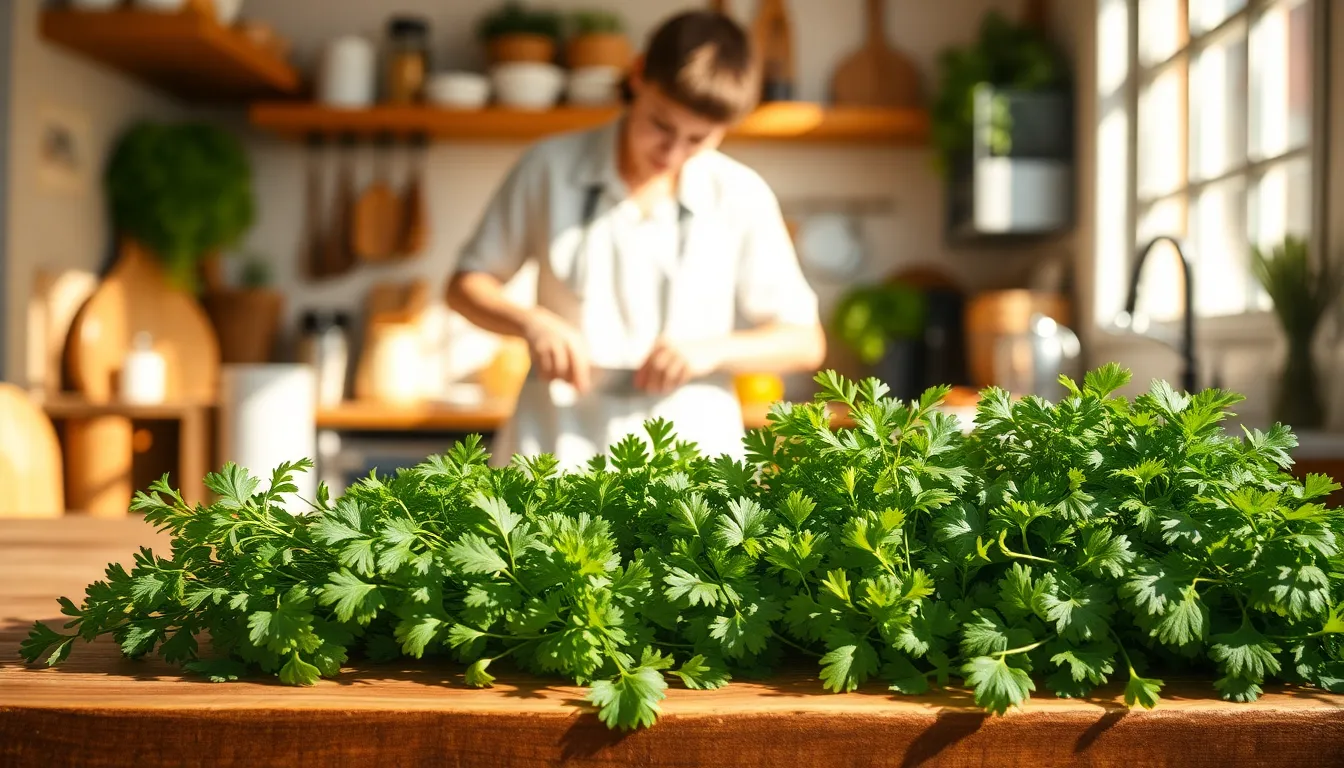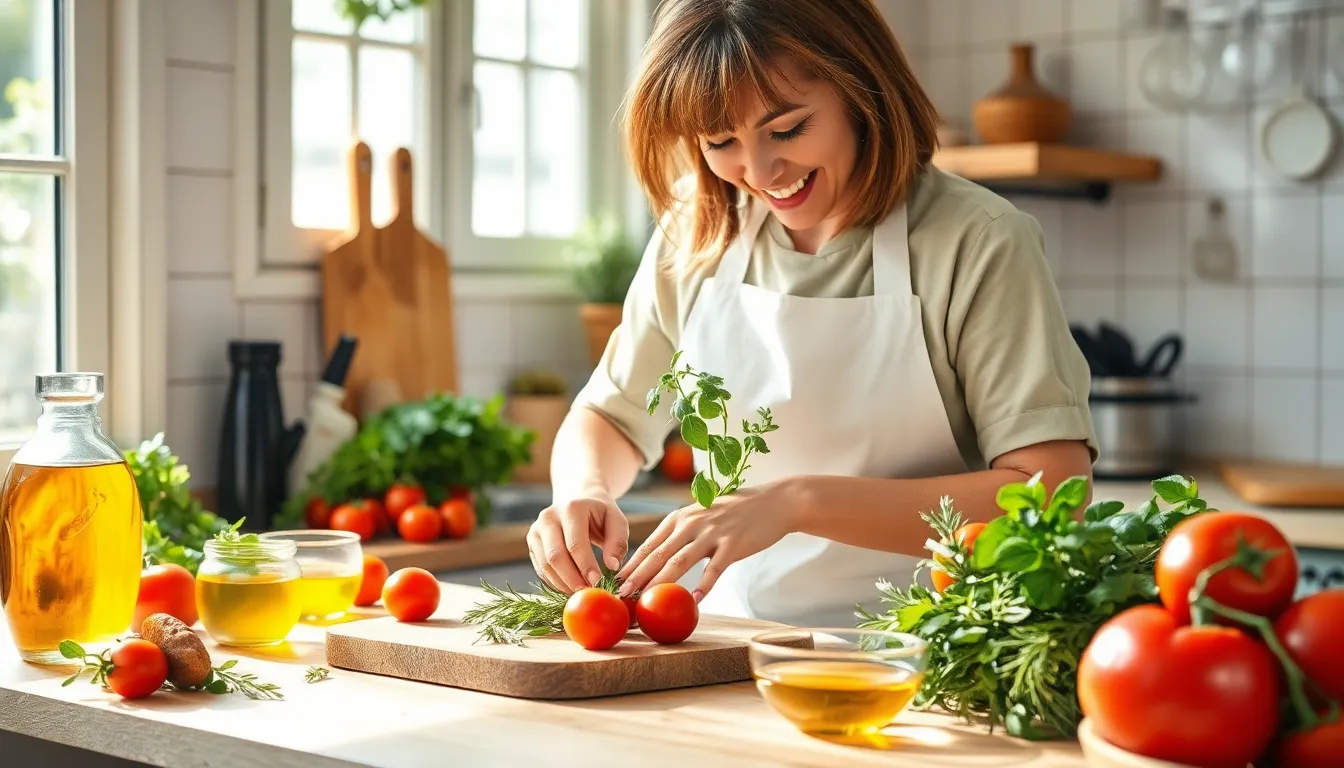Imagine stepping into your kitchen and transforming it into a fragrant herb garden. Herbal cooking isn’t just a culinary trend; it’s a flavorful adventure waiting to happen. With a sprinkle of creativity and a dash of nature’s bounty, anyone can elevate their meals from mundane to magical. Who knew that a handful of basil or a pinch of rosemary could turn a simple dish into a gourmet experience?
Table of Contents
ToggleWhat Is Herbal Cooking?
Herbal cooking involves using fresh herbs to enhance the flavors of dishes. It emphasizes the natural oils and compounds found in plants like basil, cilantro, and thyme.
Preparation often includes various techniques, from chopping herbs to infusing oils, allowing the tastes to blend seamlessly. Ingredients work together to create layers of flavor, transforming simple meals into gourmet experiences.
High-quality herbs play a significant role in herbal cooking. Freshly picked herbs provide vibrant flavors compared to dried ones, which can lose potency over time. Many cooks prefer using herbs straight from their gardens, ensuring maximum freshness and taste.
A range of dishes can benefit from herbal cooking. From savory soups to refreshing salads, herbs add depth and complexity. For instance, a sprinkle of parsley brightens up a hearty stew, while mint can elevate desserts or beverages.
Seasonal availability influences the choice of herbs. Spring offers chives and dill, summer brings basil and cilantro, while winter may feature sage and rosemary. Cooks can adapt their dishes based on what is in season, promoting sustainability and flavor.
Exploration of different cuisines enriches the experience. Mediterranean, Asian, and Latin American dishes frequently highlight herbs, offering new flavors to discover. This culinary journey encourages individuals to experiment, creating unique twists on traditional recipes.
In essence, herbal cooking inspires creativity. By using herbs, cooks unlock a world of flavors, enhancing the dining experience. Embracing fresh herbs can turn everyday meals into extraordinary culinary adventures.
Benefits of Herbal Cooking

Herbal cooking offers numerous advantages, enhancing not only dishes but also overall well-being.
Health Benefits
Incorporating herbs into meals boosts nutritional value significantly. Fresh herbs like parsley, cilantro, and thyme contain essential vitamins and antioxidants. These compounds support immune function and reduce inflammation. Studies show that herbs can also contribute to better digestion when used in savory dishes. Basil and oregano, for example, may aid in alleviating gastrointestinal issues. Consuming herbs regularly can promote heart health by easing blood pressure and cholesterol levels. Moreover, the natural compounds found in herbs often possess antimicrobial properties, helping to combat pathogens in food.
Culinary Advantages
Using herbs enhances flavors and adds depth to any dish. Fresh herbs infuse meals with vibrant and complex profiles, transforming ordinary recipes into memorable ones. For instance, a dash of rosemary in roasted vegetables elevates their taste dramatically. Herbs also provide a natural substitute for salt, making dishes healthier without sacrificing flavor. Experimenting with various herbs introduces culinary diversity and creativity, allowing cooks to explore global cuisines. Additionally, herbs can be preserved easily, providing year-round access to fresh flavors when dried or frozen.
Popular Herbs Used in Cooking
Herbs play a crucial role in culinary practices, enhancing flavors and bringing dishes to life. This section highlights three popular herbs that elevate cooking experiences.
Basil
Basil boasts a sweet, aromatic profile, often found in Mediterranean cuisine. It adds depth to sauces, salads, and marinades. Fresh basil leaves release essential oils that infuse dishes with a vibrant flavor. Varieties like sweet basil and Thai basil differ slightly in taste and aroma. Pairing basil with tomatoes creates a classic combination in dishes like Caprese salad. Notably, it’s rich in vitamins A, C, and K, making it a nutritious addition.
Rosemary
Rosemary features a robust, pine-like flavor that complements roasted meats and vegetables. This herb thrives in Mediterranean dishes, adding warmth to recipes for soups and stews. Fresh rosemary enhances grilling techniques, offering a fragrant smoke when used as skewers. Its antioxidants support overall health, including anti-inflammatory benefits. Many cooks use rosemary to infuse oils, creating exquisite dressings and marinades. Remember, a little goes a long way, as its strong flavor can overpower milder ingredients.
Thyme
Thyme carries a subtle earthiness that works well in a variety of cuisines. This herb is a staple in French and Italian cooking, enriching sauces, marinades, and braised dishes. Fresh thyme’s tiny leaves release a delicate, savory aroma during cooking, making it a favorite for soups and roasted dinners. Its medicinal properties include antioxidant effects and potential heart health support. Often, cooks use thyme in herb blends to create balanced seasoning profiles. Dried thyme also retains flavor, offering versatility throughout the year.
Techniques for Herbal Cooking
Herbal cooking employs various techniques that elevate flavors and enhance dishes. Understanding these methods can significantly improve culinary results.
Fresh vs. Dried Herbs
Fresh herbs deliver vibrant flavors that dried herbs often lack. When using fresh options, incorporate them at the end of cooking for maximum flavor retention. Conversely, dried herbs release their essence more slowly, making them ideal for long-cooking dishes such as stews. Check for potency; dried herbs typically require a smaller amount than fresh due to their concentrated nature. The choice between fresh and dried depends on the desired flavor profile and cooking technique.
Pairing Herbs with Different Cuisines
Pairing herbs with cuisines creates harmonious flavor profiles. Mediterranean dishes benefit from herbs like basil and oregano, which complement tomatoes and olive oil beautifully. Asian cuisines often utilize cilantro and lemongrass, enhancing fresh flavors in dishes like salads and stir-fries. In French cuisine, thyme and tarragon create depth in sauces and roasted dishes. Understanding these combinations improves the overall taste experience, encouraging experimentation in meal preparation.
Tips for Growing Your Own Herbs
Growing herbs at home offers a rewarding experience and enhances culinary adventures. Start by selecting the right location, as most herbs thrive in sunny spots with at least six hours of sunlight daily. Containers work well for those with limited space, allowing gardeners to bring herbs closer to kitchens.
Choosing high-quality seeds or seedlings is essential. Popular options include basil, parsley, and cilantro, each offering unique flavors for various dishes. Watering needs vary; it’s important to keep the soil evenly moist without overwatering, which can lead to root rot.
Soil quality plays a critical role in herb growth. Using well-draining potting mix ensures proper aeration and moisture retention. Adding organic compost enriches the soil, providing nutrients for healthier plants.
Pruning helps encourage bushy growth. Regularly trimming stems and removing flowers prevents herbs from going to seed, maintaining flavor and vigor. Pest management is also necessary; regularly inspecting plants for aphids or spider mites keeps herbs healthy.
Fertilizing every four to six weeks supports growth. Organic fertilizers, like fish emulsion or seaweed extract, promote healthy development without harmful chemicals. Seasonal changes influence herb selection and care; some herbs flourish in cooler months, while others prefer warm conditions.
Lastly, harvesting herbs correctly preserves their quality. Snipping leaves from the top encourages fuller growth, offering freshly picked flavors for dishes. Following these tips can transform any garden into a thriving herb haven, allowing for endless culinary creativity.
Herbal cooking offers a vibrant way to enhance culinary experiences while promoting health and well-being. By incorporating fresh herbs into meals, cooks can elevate flavors and create dishes that are both delicious and nutritious. The versatility of herbs like basil, rosemary, and thyme allows for endless experimentation across various cuisines.
Growing herbs at home not only enriches the cooking process but also connects individuals with the food they prepare. With the right techniques and care, anyone can cultivate their own herb garden, ensuring a steady supply of fresh ingredients. Embracing herbal cooking opens the door to a world of flavor and creativity, transforming everyday meals into extraordinary culinary adventures.







